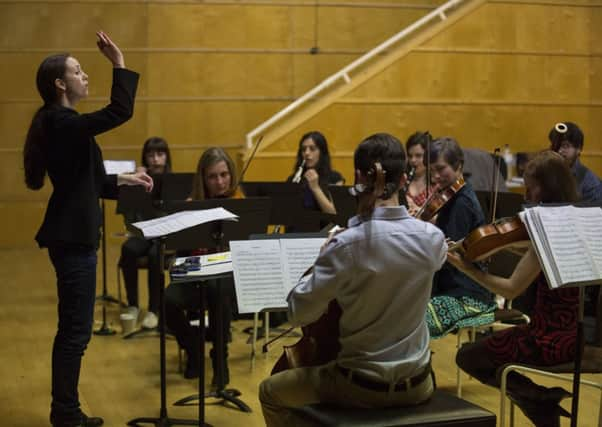Glasgow New Music Expedition boon for new composers


Who’d have thought? A brand new mixed ensemble, playing a programme of exclusively new music by a largely unknown collection of young Scots-based composers, launches itself in Glasgow, and there’s not an empty seat in the house.
Granted, last Saturday’s inaugural concert by the Glasgow New Music Expedition (GNME) was staged in the studio-size intimacy of the Ledger Recital Room at the Royal Conservatoire of Scotland (RCS), so economies of scale come into play. But it was a capacity audience; that in itself is something to cheer about.
Advertisement
Hide AdAnd given the rarefied, untested nature of the programme, the fact the group is currently an unfunded body, that this was a genuinely enthusiastic and supportive crowd, then you have to believe there is a niche, and almost definitely a requirement, for this type of initiative and this type of group.
So what is the GNME about? What does it do that the Red Note Ensemble, Daniel’s Beard, the Hebrides or Paragon Ensembles don’t already do? According to both its artistic director, Glasgow-born composer Richard Greer, and principal conductor Jessica Cottis, GMNE is quite simply a professional ensemble dedicated exclusively to performing new music by Scottish composers.
There are strong links with the RCS, which, Greer says “was kind enough to help us mount the debut concert”. Greer is a graduate composer of the Conservatoire; Cottis the first conducting fellow there before embarking on a professional career; the board of directors includes former RCS principal John Wallace and current head of composition Gordon McPherson; the composers featured in Saturday’s six world premieres are either RCS-trained composers or staff.
And there’s a clear sense of adding to what already exists within the RCS’ highly-active student compositional initiatives, a new dimension that opens up public, professional opportunities for these composers once they leave the institutional cocoon. “We’re really building on the long-established Plug Festival [the RCS’ annual in-house showcase of mainly student compositions], and providing exposure for composers who, at the point of embarking on a career, would struggle to have their music performed,” says Greer.
Just look at some of those whose works received first performances on Saturday: Euan Ferguson, Michael McEnery, Nora Marazaite and Greer himself. New names to most of us, but every one deserving live exposure, if for no other reason than to see their music come alive and be heard, and to learn from the experience. All are recent graduates of the RCS.
True, each these world premieres had something of the embryonic about them. Ferguson’s Fugere takes issue with the principles of fugue, effectively throwing it aside to produce an almost manic reaction to its structural complexity. If the Stravinsky-like opening felt uncertain in its well-intentioned aims, the ensuing build-up, complete with belligerent comment from the brass, suggested a latent sense of self-belief.
Advertisement
Hide AdMcEneny’s Shadows takes its initial cue from the well-worn path of minimalism, which the composer addresses with some assertiveness and an intriguing range of colours. The performers seemed more instantly at ease with the fluidity of his instrumental textures.
No lack of confidence, either, in the power play of Nora Marazaite’s Ubik, named after Philip K Dick’s 1969 science fiction novel of the same name. Or from Greer’s Orbiter, a musical trip through space that opens with an intoxicating complexity of rhythms, before settling, perhaps too comfortably, into a rock minimalism groove. A softish option for a piece with a very interesting departure point.
Advertisement
Hide AdWe heard those alongside the more experienced confidence of McPherson’s specially-written Frankensaint (a brutal, ironic and entertaining stab at ludicrous elements of organised religion) and fellow RCS teacher Tom David Wilson’s Locus Secundus-Giudecca (a coloristic impression evoking the lugubrious enchantment of Venice).
It was a promising start for the GNME ensemble. Cottis found positive energy in her players, not least a sense of textural definition that fed through most of the short performances. Earlier on Saturday, the players were involved in a workshop session with school-age student composers of the RCS’s Juniors department. “It’s important that budding composers are not only given a chance to hear the music they write at the earliest opportunity, but that they are exposed to what is actually possible on the instruments they score for,” Cottis explains. “Professional players will soon tell you if you have asked the impossible.”
It’s GNME’s intention to expand its workshop/performance activity into wider areas of Scottish musical education and to explore varied modes of presentation and venue. For that to happen, it needs to secure a more sustainable funding formula than the current hand-to-mouth existence it is inevitably experiencing as a new venture. “We applied for Creative Scotland funding, but were rejected this time round,” says Greer.
Saturday’s launch day had that youthful sense of excitement I’ve experienced at many such events over the past 35 years. Some find a raison d’être and a following and go on to great things. Uniqueness, relevance, creativity and excellence are the key combination for success. GNME has made a good start. And it’s a cause worth championing.
FOLLOW US
SCOTSMAN TABLET AND MOBILE APPS